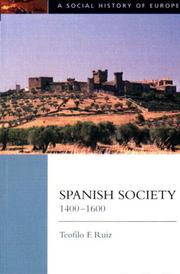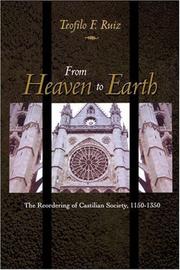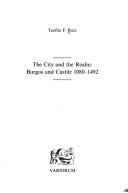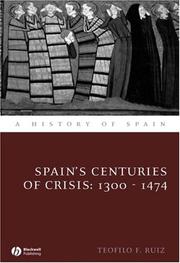| Listing 1 - 10 of 37 | << page >> |
Sort by
|

ISBN: 0582286921 0582286913 Year: 2001 Publisher: Harlow Pearson Education
Abstract | Keywords | Export | Availability | Bookmark
 Loading...
Loading...Choose an application
- Reference Manager
- EndNote
- RefWorks (Direct export to RefWorks)
History of Spain --- anno 1400-1499 --- anno 1500-1599 --- Social classes --- Spain --- Social conditions --- Social life and customs. --- History

ISBN: 0691001219 0691171505 1400880122 Year: 2004 Publisher: Princeton Oxford Princeton University Press
Abstract | Keywords | Export | Availability | Bookmark
 Loading...
Loading...Choose an application
- Reference Manager
- EndNote
- RefWorks (Direct export to RefWorks)
Land tenure --- Propriété foncière --- History. --- Histoire --- Castile (Spain) --- Castille (Espagne) --- Social conditions. --- Conditions sociales --- Propriété foncière --- Social conditions --- History --- Spain

ISBN: 0860783294 9780860783299 Year: 1992 Volume: CS375 Publisher: Aldershot (Hants): Variorum,
Abstract | Keywords | Export | Availability | Bookmark
 Loading...
Loading...Choose an application
- Reference Manager
- EndNote
- RefWorks (Direct export to RefWorks)
Spain --- Castile (Spain) --- Burgos (Spain) --- History --- Economic conditions --- Politics and government --- -Burgos (Spain) --- -Castile (Spain) --- -Spain --- -Castile --- Castilla (Spain) --- -Economic conditions --- Espanja --- Spanien --- Hiszpania --- Spanish State --- España --- Estado Español --- Espagne --- Hispania --- Sefarad --- Sepharad --- Shpanye --- Shpanie --- Reino de España --- Kingdom of Spain --- Reino d'Espanya --- Reinu d'España --- Espainiako Erresuma --- Regne d'Espanya --- Reiaume d'Espanha --- Espanya --- Espanha --- スペイン --- Supein --- イスパニア --- Isupania --- 711-1516 --- Spain - History - 711-1516 --- Castile (Spain) - Economic conditions --- Castile (Spain) - Politics and government --- Burgos (Spain) - Economic conditions --- Burgos (Spain) - History

ISBN: 9781405127899 Year: 2007 Publisher: Malden, MA Oxford : Blackwell,
Abstract | Keywords | Export | Availability | Bookmark
 Loading...
Loading...Choose an application
- Reference Manager
- EndNote
- RefWorks (Direct export to RefWorks)
Spain --- Espagne --- History --- Histoire --- 946.02 --- Geschiedenis van Spanje: Arabische suprematie--(711-1479) --- 946.02 Geschiedenis van Spanje: Arabische suprematie--(711-1479) --- 1300-1474
Book
ISBN: 9780691153582 0691153582 9780691153575 0691153574 Year: 2012 Publisher: Princeton, N.J. Princeton University Press
Abstract | Keywords | Export | Availability | Bookmark
 Loading...
Loading...Choose an application
- Reference Manager
- EndNote
- RefWorks (Direct export to RefWorks)
Ceremonial entries --- Festivals --- Political culture --- Popular culture --- History. --- Political aspects --- Philip --- Travel. --- Spain --- History --- Social life and customs. --- Politics and government. --- Fêtes --- Culture populaire --- Aspect politique --- Espagne --- Histoire --- Moeurs et coutumes --- Politique et gouvernement --- Political aspects&delete& --- Filips --- Felipe --- Filipe --- Philippe --- Filippe --- Philips --- Fīlīb --- Philipp --- Filippo --- Culture --- Political science --- Culture, Popular --- Mass culture --- Pop culture --- Popular arts --- Communication --- Intellectual life --- Mass society --- Recreation --- Entrees (Ceremonies) --- Entries (Ceremonies) --- Royal entries --- State entries --- Rites and ceremonies --- Visits of state --- Days --- Manners and customs --- Anniversaries --- Fasts and feasts --- Pageants --- Processions
Book
ISBN: 9780691153575 Year: 2012 Publisher: Princeton ; Oxford : Princeton University Press,
Abstract | Keywords | Export | Availability | Bookmark
 Loading...
Loading...Choose an application
- Reference Manager
- EndNote
- RefWorks (Direct export to RefWorks)
"A King Travels" examines the scripting and performance of festivals in Spain between 1327 and 1620, offering an unprecedented look at the different types of festivals that were held in Iberia during this crucial period of European history. Bridging the gap between the medieval and early modern eras, Teofilo Ruiz focuses on the travels and festivities of Philip II, exploring the complex relationship between power and ceremony, and offering a vibrant portrait of Spain's cultural and political life.Ruiz covers a range of festival categories: carnival, royal entries, tournaments, calendrical and noncalendrical celebrations, autos de fe, and Corpus Christi processions. He probes the ritual meanings of these events, paying special attention to the use of colors and symbols, and to the power relations articulated through these festive displays. Ruiz argues that the fluid and at times subversive character of medieval festivals gave way to highly formalized and hierarchical events reflecting a broader shift in how power was articulated in late medieval and early modern Spain. Yet Ruiz contends that these festivals, while they sought to buttress authority and instruct different social orders about hierarchies of power, also served as sites of contestation, dialogue, and resistance. "A King Travels" sheds new light on iberian festive traditions and their unique role in the centralizing state in early modern Castile.
Festivals --- Ceremonial entries --- Popular culture --- Political culture --- Fêtes --- History. --- Political aspects --- Philip --- Travel. --- Espagne --- Spain --- History --- Social life and customs. --- Politics and government. --- Fêtes
Book
ISBN: 8434408120 Year: 1981 Publisher: Barcelona : Ariel,
Abstract | Keywords | Export | Availability | Bookmark
 Loading...
Loading...Choose an application
- Reference Manager
- EndNote
- RefWorks (Direct export to RefWorks)
Power (Social sciences). --- Castile (Spain) --- Burgos (Spain) --- Social conditions.
Book
ISBN: 1283152517 9786613152510 1400839424 Year: 2011 Publisher: Princeton, N.J. : Princeton University Press,
Abstract | Keywords | Export | Availability | Bookmark
 Loading...
Loading...Choose an application
- Reference Manager
- EndNote
- RefWorks (Direct export to RefWorks)
This book reflects on Western humanity's efforts to escape from history and its terrors--from the existential condition and natural disasters to the endless succession of wars and other man-made catastrophes. Drawing on historical episodes ranging from antiquity to the recent past, and combining them with literary examples and personal reflections, Teofilo Ruiz explores the embrace of religious experiences, the pursuit of worldly success and pleasures, and the quest for beauty and knowledge as three primary responses to the individual and collective nightmares of history. The result is a profound meditation on how men and women in Western society sought (and still seek) to make meaning of the world and its disturbing history. In chapters that range widely across Western history and culture, The Terror of History takes up religion, the material world, and the world of art and knowledge. "Religion and the World to Come" examines orthodox and heterodox forms of spirituality, apocalyptic movements, mysticism, supernatural beliefs, and many forms of esotericism, including magic, alchemy, astrology, and witchcraft. "The World of Matter and the Senses" considers material riches, festivals and carnivals, sports, sex, and utopian communities. Finally, "The Lure of Beauty and Knowledge" looks at cultural productions of all sorts, from art to scholarship. Combining astonishing historical breadth with a personal and accessible narrative style, The Terror of History is a moving testimony to the incredibly diverse ways humans have sought to cope with their frightening history.
Civilization, Western. --- Uncertainty --- Terror --- Disasters --- Adjustment (Psychology) --- Social aspects --- History.
Book
ISBN: 9781138957862 Year: 2017 Publisher: Abingdon Routledge
Abstract | Keywords | Export | Availability | Bookmark
 Loading...
Loading...Choose an application
- Reference Manager
- EndNote
- RefWorks (Direct export to RefWorks)
Social classes --- Spain --- Social conditions --- Social life and customs. --- History
Book
ISBN: 1280494085 9786613589316 1400842247 Year: 2012 Publisher: Princeton : Princeton University Press,
Abstract | Keywords | Export | Availability | Bookmark
 Loading...
Loading...Choose an application
- Reference Manager
- EndNote
- RefWorks (Direct export to RefWorks)
A King Travels examines the scripting and performance of festivals in Spain between 1327 and 1620, offering an unprecedented look at the different types of festivals that were held in Iberia during this crucial period of European history. Bridging the gap between the medieval and early modern eras, Teofilo Ruiz focuses on the travels and festivities of Philip II, exploring the complex relationship between power and ceremony, and offering a vibrant portrait of Spain's cultural and political life. Ruiz covers a range of festival categories: carnival, royal entries, tournaments, calendrical and noncalendrical celebrations, autos de fe, and Corpus Christi processions. He probes the ritual meanings of these events, paying special attention to the use of colors and symbols, and to the power relations articulated through these festive displays. Ruiz argues that the fluid and at times subversive character of medieval festivals gave way to highly formalized and hierarchical events reflecting a broader shift in how power was articulated in late medieval and early modern Spain. Yet Ruiz contends that these festivals, while they sought to buttress authority and instruct different social orders about hierarchies of power, also served as sites of contestation, dialogue, and resistance. A King Travels sheds new light on Iberian festive traditions and their unique role in the centralizing state in early modern Castile.
Festivals --- Festivals --- Ceremonial entries --- Popular culture --- Political culture --- History. --- Political aspects --- History. --- History. --- History. --- History. --- Philip --- Travel. --- Spain --- Spain --- Spain --- Spain --- History --- History --- Social life and customs. --- Politics and government. --- Alfonso XI. --- Carnival. --- Catholic devotional cycle. --- Christians. --- Corpus Christi. --- Crown of Aragon. --- Ferdinand III. --- Fernando of Antequera. --- Guadalquivir. --- Iberian festivals. --- Islamic Spain. --- Moors. --- Philip II. --- Seville. --- Spain. --- Spanish celebrations. --- Spanish culture. --- Spanish festivals. --- Spanish influence. --- Spanish politics. --- Western Europe. --- artificial warfare. --- authority. --- baldachin. --- birth. --- celebrations. --- celebratory cycles. --- ceremony. --- chivalrous activities. --- chivalrous literature. --- church ceremonies. --- coming of age. --- contestation. --- coronation. --- courtly culture. --- courtly literature. --- cultural performances. --- death. --- eastern kingdoms. --- festivities. --- fictitious battles. --- fictitious combat. --- formal entry. --- ideological purposes. --- juego de caas. --- kingly hegemony. --- life cycle. --- ludic events. --- marriage. --- martial displays. --- martial festivals. --- medieval festivals. --- mock warfare. --- multivocal performances. --- noncalendrical celebrations. --- palio. --- political performances. --- political realities. --- political shifts. --- power. --- princely entry. --- princely power. --- reception. --- regal procession. --- resistance. --- ritual making. --- royal entries. --- royal entry. --- social meanings. --- social relations. --- subversive themes. --- tournament. --- tournaments. --- transgressive behavior. --- triumphal entry.
| Listing 1 - 10 of 37 | << page >> |
Sort by
|

 Search
Search Feedback
Feedback About UniCat
About UniCat  Help
Help News
News